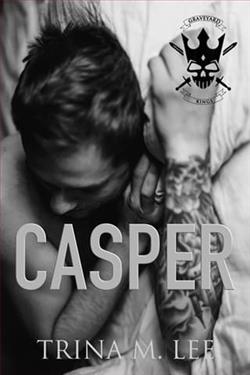Page 53 of Unbound
"I think I've got it," he said, settling across from me with easy familiarity. "The constitutional framework, the precedential support, the equal protection analysis. I actually think I can argue this convincingly."
"You've been able to argue it convincingly for a week," I said. "The question is whether you can argue it passionately."
"What do you mean?"
"I mean constitutional law isn't just about logic and precedent. It's about advocacy. It's about making people believe that the rights you're defending matter, that the people you're representing deserve protection."
Jesse was quiet for a moment, considering. "You want me to practice believing in what I'm arguing."
The words hung between us, heavier than I'd intended. Jesse's eyes widened slightly, and I could see him processing the implications.
"I'm not asking you to change your personal beliefs," I said quickly. "I'm asking you to understand why this case mattered to the people who brought it."
I pulled out a photo I'd printed—James Obergefell and John Arthur on their wedding day, John in a wheelchair on a medical plane because he was too sick to travel any other way.
"That's not abstract constitutional theory," I continued. "That's two people who loved each other, who committed their lives to each other, who wanted the same legal protections that opposite-sex couples take for granted."
Jesse stared at the photo for a long moment. When he looked up, something had shifted in his expression.
"Okay," he said quietly. "Let's practice."
For the next two hours, we rehearsed our presentation. At first, Jesse delivered his portion competently but mechanically. But as we practiced, something changed. His voice grew stronger, more confident. His gestures became natural rather than careful. He started making eye contact with our imaginary audience instead of reading from his notes.
As we rehearsed, the space between us seemed to shrink. Jesse would lean closer to read from my notes, his thigh pressing against mine under the table. When he got excited about a particularly elegant legal argument, he'd gesture with his hands, occasionally brushing my arm, my shoulder.
Each touch sent electricity shooting through me, and from the way Jesse's breath would catch, I knew he felt it too. The careful distance he'd maintained for weeks was crumbling, replaced by something electric and dangerous.
"Let's try it one more time," I said after our fourth run-through.
I delivered my opening on the constitutional protection of fundamental rights from government interference, then Jesse began his section on equal protection.
"The Fourteenth Amendment promises that no state shall deny any person the equal protection of the laws," he said, his voice clear and strong. "This isn't just abstract legal language—it's a promise that government will treat all citizens with equal dignity and respect."
He was looking directly at our imaginary audience now, his notes forgotten.
"When Ohio refused to recognize James Obergefell's marriage to John Arthur, they weren't just applying a different legal definition. They were telling Mr. Obergefell that his twenty-year relationship didn't matter as much as an opposite-sex couple's relationship. They were telling him that he was a second-class citizen."
Jesse's voice grew stronger, more passionate.
"The Constitution doesn't permit such arbitrary distinctions. When states deny recognition to same-sex marriages, they violate that fundamental promise. They create a hierarchy where some loving, committed relationships matter and others don't. The Constitution forbids such hierarchies of human worth."
When he finished speaking, his chest was rising and falling visibly with each breath. The normally pristine collar of his shirt was rumpled where he'd tugged at it unconsciously during his argument, and his cheeks were flushed with more than just passion for constitutional law. He looked electric—alive in a way I'd never seen before, pupils wide and dark.
"That was incredible," I rasped, surprised by how raw my voice sounded. My fingers twitched with the need to reach for him.
Jesse blinked as if emerging from a dream, his lips slightly parted. A bead of sweat trailed down his temple, disappearing into the golden stubble at his jaw. When he swallowed, I tracked the movement of his throat like a roadmap to all the places I wanted to touch.
"I meant it," he whispered, the words rough with emotion. His hand rested on the table between us, fingers splayed. A challenge. An invitation. "Every word."
The confession settled between us like something holy. This wasn't performative—I could still hear the tremor in his voice from when he'd spoken about love being treated equally under the law. The way his knuckles had whitened around his notes when he described discrimination.
Before I could stop myself, I reached across and covered his hand with mine. The contact burned like pressing against a radiator after coming in from the cold. He was shaking, but he didn't pull away—instead, his fingers twitched beneath mine, sliding until our palms aligned.
"I know you did," I murmured, stroking my thumb along the ridge of his knuckles. A shiver ran through him, his breath catching audibly.
For a suspended moment we existed in that quiet space, fingers intertwined. Then his gaze dropped to my mouth, lingering with unmistakable hunger. His lips parted further, the tip of his tongue darting out to wet them—a reflex that punched the air from my lungs.
I leaned in without thinking, pulled by an inexorable gravity. The world shrunk to the few inches between our faces, to the quickening of his breath against my skin.















